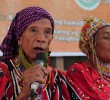By Ren Jalaluddin Ropeta
The GRP-MILF standoff over the question of ancestral domain claim lies on the fact that the two parties� perspective on the right to ancestral land and self- determination is separated by a mountain of differences.
As any government exists to maintain the status quo � which in the Philippines�s case is the rule of the elite � the Arroyo government will ensure strong political and economic hold over the ARMM (Autonomous Region in Muslim Mindanao) even when the ARMM is turned over to the hands of the MILF.
Even upon its conclusion, there remains a big question on whether GRP-MILF peace agreement will truly address the Bangsamoro people�s aspirations for land and genuine peace — all of which have been deprived of them over centuries of colonial subjugation and, in more recent years, by the state�s policy of marginalization, discrimination, and militarization.
These irreconcilable differences between the state and the Moro people�s liberation movement, thus puts us to ponder: Is there a place for genuine autonomy in this fake democracy? How will the current peace negotiations NOT repeat the mistakes of the GRP-MNLF (Moro National Liberation Front) peace talks which showcased the Philippine government�s blatant deception of the Bangsamoro people�s struggle?
The ARMM, when turned over to the leadership of MNLF leader Prof. Misuari during the Aquino regime, merely remained in the clutches of the Philippine government, and suffered from the same inutility of the puppet-imperial government. And now that the GRP-MILF peace talks are in a perilous quandary, how do we ensure that the people�s aspirations do not get compromised?
On a positive note, there is a resounding call for the resumption of the peace talks and the genuine adherence of the government to the agreement from both Muslim and non-Muslim faith and sectors. A very sound advocacy for genuine peace and development in Mindanao stands strong. More important is the guarded optimism of the Moro people who have learned from very recent experiences that peace and real development in Mindanao is not entirely dependent on the peace agreement and that their continuing vigilance is fundamental in the genuine materialization of their aspirations for land and self-determination — the very fabric of their life as a people who deserve the chance to live free from oppression and injustice.
(The author is the vice-chairperson of the Moro-Christian Peoples� Alliance.)
Peace Process









